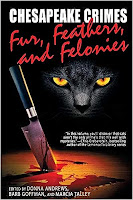by Shari Randall
The question “Are you a plotter or a pantser?” always throws me. The process has been different for every book I’ve written. I write scenes, sometimes starting with the climax, and then shuffle the scenes around and pray that they flow together. I don’t recommend this process because it usually means that I have to write the most difficult part of a book at the end: the beginning.
I wish I could start a novel at the beginning and write until the end. Not doing so always leads to lots of rewriting. For me, beginnings are hard because Ii’s not always clear where the best spot to start a story is.
Case in point. My short story “Pet,” which appeared in Chesapeake Crimes: Fur, Feathers, and Felonies. My main character, Katya, is a simple teen who came to the United States from Russia illegally and finds a dream job with a California heiress – at least she thinks it’s a dream job. In the original manuscript, I started Katya’s story on a winter’s day on her grandmother’s farm. Katya is seven-years-old, shivering, starving. Snow is falling. Baboushka has died at the hands of a merciless criminal and poor Katya has only her pet dog for comfort. I was really channeling my inner Tolstoy. Seriously, I’m tearing up right now.
When I gave the story to my editor, she sent it back with a note and a red X over the first seven pages. “Your story doesn’t start on page one,” she said, “it starts here on page seven.”
I’d fallen into the trap of the info dump. The bucket of backstory. She was right. I cut the pages and the story took off.
Why do I bring this up? Because I’m starting a new book. I have 11,349 words worth of scenes, but I’m not sure where the story begins. Sigh. Time to shuffle the scenes and see what happens.
Writers, how do you write a good beginning for your story?
Shari Randall is the author of the beloved Lobster Shack Mystery series. She writes the new Ice Cream Shop Mystery series under the pen name Meri Allen. The latest in the series is Fatal Fudge Swirl.



I hear you. The few times I've worked at stories, I've fallen into the data dump trap. Which is ironic since I hate reading a data dump in a book. It's something I'll call out in a review.
ReplyDeleteI get the whole thing written and then figure out where the story should start. If there is stuff before that the reader needs, I find the right place to tuck that information in.
ReplyDeleteWhich sounds rather organized, which is not an accurate description of the process!
Good luck, Shari.
Sometimes it's hard to tell the difference between an info dump & setting up the tension. A good critique group (or editor) will know right away.
ReplyDeleteHi Mark, How often do I find myself doing something I know I shouldn't do (prologues anybody?) All the time!
ReplyDeleteI didn't know you wrote fiction! Welcome to the club and keep me posted!
Hi Jim, Sounds a bit like my "process!" Knowing your organized financial mind, I figured you'd have the whole thing plotted on multiple spreadsheets before you started.
ReplyDeleteKM, you are so right. The key is finding that right critique group or editor. I think we develop an inner editor that sends up a flare when something isn't working, but it's so hard to kill the darlings.
ReplyDeleteIt’s especially difficult in a series, I think. How do you provide enough information for new readers who jump in on book 3 without being repetitive and boring for constant readers…
ReplyDeletewrite the book, and then you'll know where to start at the beginning.
ReplyDeleteLori, this is too true. First in series is definitely the hardest to write.
ReplyDeleteHi Margaret, Yep that’s the only way!
ReplyDeleteGreat blog, Shari! I allow myself to write the dump knowing I’m writing for me. When I hit the grand finale, I look at the first three (yes, three) chapters and decide what I needs to be threaded through and what can be dumped. Then I do it. Darlings and all. Most times I’m close to the beginning of the real story. Fortunately, my editor keeps me on the straight and narrow.
ReplyDeleteHi Kait, that’s such an important point - we all need a good editor to keep us on the straight and narrow.
ReplyDelete